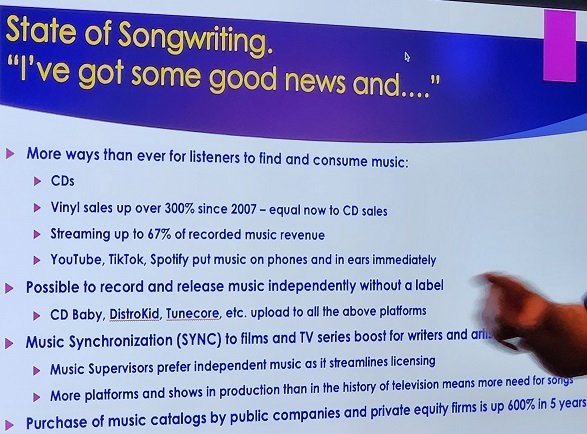Moments Make Memories and a Life
Moments. Small and large, added together, they make a life. But some are the fabric and others are the color. It’s fun to remember the color. It’s even more fun to blend it, however real it is, into a piece of fiction.
A couple of weeks ago, a friend and I caught a Jason Isbell concert in St. Augustine, Florida. I’d secured the tickets, but I’d forgotten the upgrade for decent parking.
Bud Tower (left) and Drew Ramsey and talk about song writing at Killer Nashville. (credit: David Ryan)
We ended up driving to the hinterlands of a nearby state park, a spot that necessitated a shuttle ride to the night’s amphitheater. Hours later, when the show ended, we huddled on an over-filled shuttle bus, which creakily made its way back to the faraway parking lot.
Filled with tired and mostly inebriated passengers, the bus was dark and quiet until the shuttle driver’s playlist hit the sound system. On came Stevie Nicks’ ballad version of “Landslide.” A woman up front, her friend and another couple women in the back simultaneously sang the second line: “I climbed a mountain and I turned around . . .”
Then, everyone else on the bus chimed in: “And I saw my reflection in the snow-covered hills . . .”
And off we went, a bus full of strangers rocking and bumping along with an impromptu, melodic karaoke.
For me, this was no isolated incident. It took me back to an evening in Tuscany, Italy, more than a decade earlier. That full-moon night, my wife and I were part of a large group touring Italy by bus. We’d left Florence for a morning visit to the town square in Florence, an afternoon walk through San Gimignano and then a dinner in the countryside.
As anyone knows who has been on such a tour, especially of Italy, such dinners come with copious amounts of food and drink. Sated and drunk, we collapsed into our bus seats for the two-hour ride back to Florence.
Armed with her trusty microphone, our tour guide, a delightful middle-age Italian woman named Vickey, told stories from the front of the bus. Then it was open mic night for anyone with a joke. After a doctor from New England delivers an off-color punchline, the comedy club closed, and Vickey turned on the music to let us sleep.
Then two things happened.
First, we made a sweeping turn on a country road — and gazed out the front window at a fat orange full moon.
“Look-a, look-a, everybody,” Vickey said in her Italian accent. “It’s a full-a moon-a! We must-a howl-a at the moon-a!”
And we did. The entire bus, with Vickey leading the way, howled and howled again. God knows what the local farmers heard that night.
Then a few minutes later, “Hotel California” hit the sound system.
Within seconds, everyone on the bus was singing with Don Henley, “On a dark desert highway, cool wind in my hair . . .”
That song also ended with a group self-applause.
Funny, the memories you take away from the world. Of all the things we saw and did in Italy — the Colosseum, the Vatican, the Sisteen Chapel, the canals of Venice — howling at the moon and delivering a rousing off-key version of “Hotel California” are two of my favorites.
I write about these slivers of my life because they say something about me. I don’t know what they say, but I know they provide a bit of background and color to whatever else is on my resume and in my background.
A flashback of the singing bus rides came during a recent few days at Killer Nashville, a crime author conference. If you’ve never been to a fiction-writing conference, know that over the course of a few days you’re almost certain to hear one of a handful of writing tenants:
· Somebody has to die in Chapter 1.
· Don’t drop a full backstory.
· When you bring a new character into the story, don’t bring him or her in alone.
· Don’t head-hop.
· Show, don’t tell.
· Scenes matter, chapters don’t.
And on and on.
But this year’s Killer Nashville featured one session I’d never seen at a crime-writing conference: Writing & Selling Storytelling Songs & Lyrics, presented by novelist and songwriter Bud Tower and Emmy-nominated songwriter Drew Ramsey. Much of the 50-minute session revolved around Ramsey’s process for writing an Emmy-nominated song on the soundtrack of the Mel Gibson movie, “We Were Soldiers.”
Drew Ramsey’s take on the state of songwriting. (credit: David Ryan)
Ramsey and Tower enlightened a small group of authors about the need to collaborate, the necessity of internal rhymes and, when telling a story in a song, the ability to tell it fast and leave a memorable ending.
“You only have three-and-a-half minutes to say what you want to say,” Ramsey said.
And then it struck me. Almost every famous song, no matter the genre, runs for less than four minutes. And yet the good ones . . . grab us and keep us. When we get taken in by the music, we learn the lyrics and we never forget them. They’re with us for life. We all have books that we read a second time before we realize we’ve read it before. But we instantly know when we’ve heard a song before.
That song, whatever it is, is a moment, part of the fabric of our life.
Back in St. Augustine, the shuttle bus arrived at its parking lot destination, and the driver threw on the parking brake. But there was a problem: Stevie Nicks hadn’t finished her song.
“We have to finish!” someone cried out.
We all laughed . . . and finished the song. And then we applauded for giving ourselves a moment.

